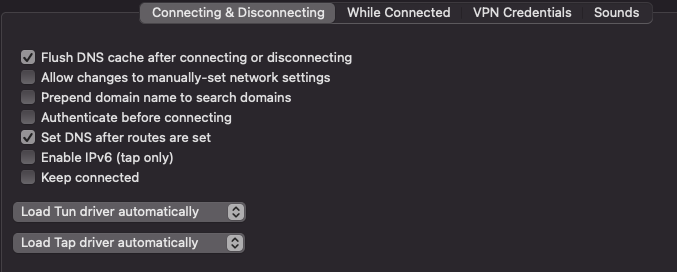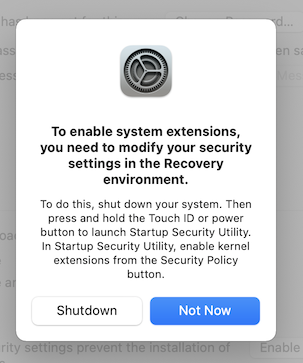MacOS 11 Big Sur was a major update that not only brought tons of under-the-hood changes to the Mac, but also introduced the most obvious layer of iOS-ification that we’ve seen on the Mac thus far.


Highlighted Articles Discussion Group | Getting Started Downloading and Installing Setup and Use Privacy and Security Reference | Troubleshooting Distributing Tunnelblick Customized Versions Localization & Translation Vulnerability FAQs |
MacOS Big Sur 11.0.1 refuses to load Tunnelblick's existing, notarized system extensions unless SIP is disabled. It isn't known if this behavior will be present in future versions of Big Sur; 11.1.0 does not require SIP to be disabled. 14 hours ago macOS Big Sur 11.3 includes a hidden 'Hello' screen saver that appears to be designed for the new iMac models, but which can also be installed on any Mac that's running the 11.3 update. MacOS Big Sur ends support for a few old Mac models that are compatible with macOS Catalina. So before you do any troubleshooting, make sure your Mac can run macOS 11 in the first place. Here’s the full list of compatible devices: MacBook (2015 or later). The OpenVPN Connect Client for macOS, latest version, currently supports these operating systems: OS X 10.8 Mountain Lion; OS X 10.9 Mavericks; OS X 10.10 Yosemite; OS X 10.11 El Capitan; macOS 10.12 Sierra; macOS 10.13 High Sierra; macOS 10.14 Mojave; macOS 10.15 Catalina; macOS 11.0 Big Sur; Downloading and installing the OpenVPN Connect.



Tunnelblick App
Highlighted Articles Discussion Group | Important: See The Future of Tun and Tap VPNs on macOS for information about changes to future versions of macOS. Tunnelblick may try to load a system extension to control the VPN tunnel. (Note: Apple previously used the terms 'kext' and 'kernel extension' but now uses the term 'system extension'.) Note: If you are using a 'tun' VPN, you can avoid needing to load a system extension by doing the following:
The 'dev-node tun' option causes OpenVPN to use a 'tun' device, which requires a system extension to be loaded. If a 'dev-node tun' option is not present and a 'dev tun' option is present, OpenVPN will use the 'utun' device which is built into macOS and does not require a system extension to be loaded. Also, see Edit or Examine an OpenVPN Configuration File. (If you are using a 'tap' VPN, Tunnelblick must load a system extension for your VPN to operate.) If you see a message similar to one of the following: Tunnelblick was not able to load a device driver (kext) that is needed to connect... Tunnelblick was not able to load a system extension that is needed to connect... There are two possible causes for this message: (1) Your version of macOS did not allow the system extension to load or you did not give permission for the system extension to load:
(2) There may be incompatible system extensions already loaded. Recent versions of Tunnelblick try to be 'good citizens' by loading system extensions only when needed, and unloading them when they are no longer needed. However, some other VPN clients (CiscoAnyConnect SSL VPN, for example) load their own, incompatible system extensions when the computer is started and leave them loaded, whether or not a VPN connection is in use. (Some non-VPN software also loads incompatible system extensions — for example, Pogoplug loads a 'com.pogoplug.xcetun' tun system extension which interferes with Tunnelblick's tun system extension. 'Security' programs also may load incompatible system extensions.) To find out if an incompatible system extension is causing the problem, use the
To unload system extensions and allow Tunnelblick to load its own system extensions, use the
(The 'sudo' is necessary because this command modifies the loading of a device driver. You will be asked for your administrator password, which will not appear (even as asterisks) when you type it.) If you find that restarting your computer reloads the system extension you might need to find where it is being loaded from. Common locations are
There are user-contributed scripts on the Downloads page that will automatically unload the Cisco system extension when Tunnelblick makes a connection, and reload the Cisco system extension when the connection is disconnected. |
